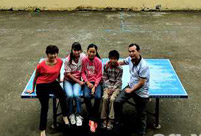JINAN, Oct. 17 -- "Do it now!" Civil servants of many local Chinese governments have been ordered to address public concerns in a more timely manner and boost administrative efficiency.
While those who use "it's not my job" or similar expressions when answering citizens' questions may be named and shamed, or even lose their jobs.
Not long ago, 18 government departments in Qufu City of east China's Shandong Province were exposed and criticized by a local newspaper for their lazy work styles.
Actually, government departments and public service centers in Qufu, hometown to Confucius, have set up a total of 101 "Do it Now" offices over the past two years in a bid to carry forward the spirit of Confucian etiquette and benevolent governance.
"Do it Now does not mean solving problems on the spot, but initiating the problem-solving mechanism immediately and unconditionally," said Li Changsheng, secretary of the city committee of the Communist Party of China (CPC).
THE BUCK STOPS HERE
Step into any government building in Qufu, and you instantly notice the Do it Now plate, on the door of the most convenient office.
"They never say 'no' to citizens," said Guo Yimin, director of the supervision committee. "Even if the problem is out of their hands, they take responsibility to contact the appropriate office and see to it."
Effective use of the Internet is another important part of performance evaluation for city departments. Since the launch of Qufu Online in 2011, 74 departments have solved more than 25,000 problems.
An even more direct way to ask for help is through the "Do it Now Hotline."
Newly recruited civil servants work for the hotline for four months before taking up their original posts.
"Anyone who has a problem always thinks of the hotline, It has become a household number," said Lu Yanqing, who has been answering the phones for the past two months.
Citizens are increasingly enamored by the hotline, with over 200 calls typically passing through the seven telephones in the center each day.
Every call has a written record, and problems that cannot be solved on the spot are transferred to the most appropriate Do it Now Office. A return call is always made to ensure the problem was solved.
"This experience helps us get familiar with the different functions of government departments as well as cultivating our patience with fellow citizens in our daily work," Lu said.
The meeting of the city Party secretary, deputy mayor and a dozen department heads with over 20 netizens a week ago, was the sixth of its kind this year.
"The street lamps in front of Qufu Middle School have been out for days," a netizen said.
"Those who are in charge must go to the site, investigate the cause and make sure those lamps are working by tomorrow," said the Party secretary Li. An official from the urban management bureau noted of the negligence and apologized to the netizen.
"I don't mind if the government is making a show or not, as long as they really solve real problems for us," said another attendee after the meeting.
UNNECESSARY MOVE?
"Isn't it just a civil servants' job to solve people's problems well and fast?"
Netizens raised their doubts after Zhijiantong, a microblogger posted a photo of the Do it Now office plate on Sina Weibo, an instant information publishing platform.
According to the Civil Servant Law, government officials are obliged to "make efforts to improve work efficiency and serve the people wholeheartedly," but the clause is rendered meaningless by lack of sound supervision and accountability.
"Do it Now Offices address perceived lazy governance, turning former regulators into public service providers," said Li.
To netizens who suspect the 101 offices mean overstaffing and a waste on public funds, Li replies that all personnel were organized from within the same departments. "Besides the responsibilities of their own posts, Do it Now officials assume extra workload to serve the city," Li said.
"A radical cure for an inefficient governance depends on the system design at the top. Do it Now Offices remake and optimize administrative processes, but do not replace existing procedures," said Li Chunmiao, research fellow with the Development Research Center of the State Council.
Do it Now is not the original creation of the Qufu government. Cities around the country have been actively exploring ways to improve governance following a rallying call to reform by Chinese Premier Li Keqiang during the 2013 meeting of the World Economic Forum.
Similar slogans and offices have sprung up in the provinces of Fujian, Guangdong and Hubei in east, south and central China, provoking controversy over local government ability to sustain such "upgraded" public services.
Xu Hang, political science professor with Nankai University, is prepared to give credit to the practices of local governments.
"Do it Now refreshes the work styles of public servants and the image of local government, which may be a big step toward the grand reform of government functions," Xu said.
 No news of survivors in Lao Airlines crash
No news of survivors in Lao Airlines crash China's destroyer Qingdao sails out of Sydney Harbor
China's destroyer Qingdao sails out of Sydney Harbor Chinese tycoon aims to restore London's Crystal Palace
Chinese tycoon aims to restore London's Crystal Palace Admirers to bid joyful goodbye to Rubber Duck
Admirers to bid joyful goodbye to Rubber Duck Photo story: For the last three students
Photo story: For the last three students  Photo story: A day in the life of a car model
Photo story: A day in the life of a car model Chinese screen goddesses from Beijing Film Academy
Chinese screen goddesses from Beijing Film Academy  Weekly Sports Photos
Weekly Sports Photos World's most amazing yacht on display in Guangzhou
World's most amazing yacht on display in Guangzhou Photo collection of Chinese Navy
Photo collection of Chinese Navy Cold air sweeps through N China
Cold air sweeps through N China The last family in shantytowns
The last family in shantytowns UNESCO world heritage site: Montale Tower
UNESCO world heritage site: Montale Tower U.S. Senate leader announces bipartisan deal
U.S. Senate leader announces bipartisan deal Fiber-optic wedding dress show shinning in Suzhou
Fiber-optic wedding dress show shinning in Suzhou Day|Week|Month